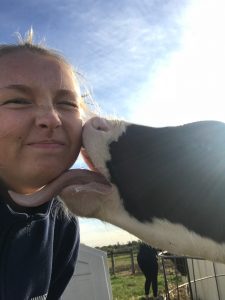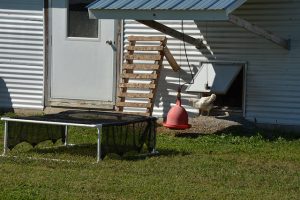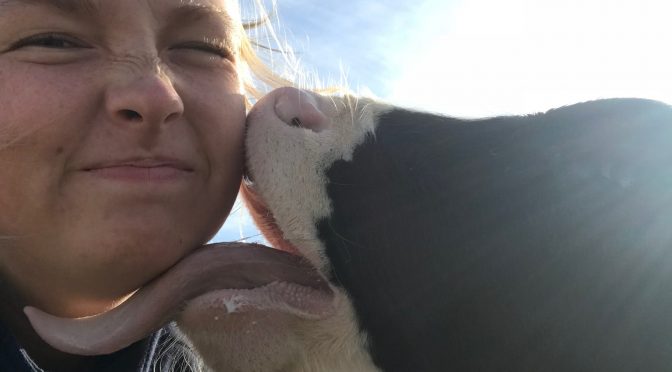Genetically Modified Organisms have greatly impacted the world we live in today both positively and negatively. Everyone has their own opinions based on GMO’s and that is completely okay. I think that GMO’s have been a blessing in disguise to be able to go into an organism and be able to turn off certain genes to make them undesirable to pests. With the power of controlling genes, you are also able to increase how much the orgamism produced and farmers can increase their yield. While this is amazing to feed more people with the same size plants some individuals may get a wrong impression of how this can be harmful to yourself and the ones around with the chemicals that have been put into the organism. Everyone has different opinions on the view of GMO’s but little to say. They have given the future hope and promise to feed the world for many more years to come.
All posts by scotten
Lecture on Biotechnology in Agriculture
Biotechnology in today’s agriculture industry is important to the point where without it we would not be able to feed the world’s population. The biotechnology used is basic sciences that use scientific discovery and new technologies for the manipulation of the building blocks of the plant’s genetic information. Farmers are able to grow five times the amount of corn that they could back in the 1930’s on 20% less land. The first to revolutionize yield production through different varieties of plants was Norman E. Borlaug. He shares his ideas with other to lower hunger issues leading him to win a Nobel Peace Prize in 1970. Ag Biotechnology allows plants to have their genetics changed to become resistant pests, disease and build a tolerance to invasive plants, also creating the GMO. Farmers have adopted this way of growing because of yield increase, energy savings, tillage effectiveness, pesticide savings, better pest control for weeds and insects, and it helps save money. Despite there being fears towards biotechnologies and GMO’s farmers see them as a haven so they are able to feed more people and also make a profit.
Experience form the Carvel Research Center & Education Center Lecture
The University of Delawares’ Carvel Center first began when in 1941 the John A. Tyndall Farm was purchased for $7,555 and was the beginning of the agricultural experiment station in Sussex County, Delaware. Over time the center had additions and name changes done to it to keep up changing times and technology. In 2006 the center was named the Elbert N. and Ann V. Carvel Research & Education Center. Over time the center has gotten many research and extension programs such as Agronomic, vegetable and fruit, Horticulture- commercial and ornamental along with Master Gardeners, Irrigation Management, Nutrient Management, 4-H youth development and so much more. For their research programs, they have variety and breeding trials for crops, pest management, fertility, organic production, irrigation management and precision agriculture. We also have chemigation studies and greenhouse studies that focus on our crops. For poultry research programs the center looks at disease and diagnostics, poultry house emissions and technology, litter management and composting. The Carvel center is serving such a great purpose for Sussex County to keep our crops safe and our poultry
Experience from the Delaware’s Green Industry Lecture
In the Delaware Green Industry in 2014 the Horticultural Product sale was $21,711,000. This number has a lot of hard work behind it with the producer, retailer, landscapers, land managers, golf courses, and suppliers of equipment. The plants begin in a nursery either a Floriculture crop which is garden plants and the nursery crops which is trees and shrubs. The nursery crops bring in approximately 8.0 billion dollars while the floriculture crops bring in apprximently 4.8 billion dollars totaling up to 13.8 billion dollars. From 2008 greenhouse and nursery receipts were selling at about 16,615,000 but in 2014 sales went up to 21,774,000. Some of the retailers that assist to the Green Industry are large hardware and home improvement stores with garden centers, local and family-owned garden stores, and landscapers. State Parks and Forests also make sure that their environment is pleasant to the eye and is healthy, along with state programs like DELDOT who are the largest landowners in the world who want to do something with roadways and make them more appealing and relaxing for drivers and incoming and passing traffic. The overall goal is to create something appealing and keep it that way to draw a second glance and want someone to be coming back for more
Expreience from the Food Safety Modernization Act
The Food Safety Modernization Act was enacted to give food products more regulation on the produce we eat. It went from a minimal regulated product to a super-regulated produce. The individuals who enacted this law was the Food and Drug Administration (FDA). This makes sure that growing the food, harvesting, packing, and holding are held to high standards to make sure the product is in the finest condition. If there is an issue with one of these sections of the foods “lifecycle”, there are five roles of contamination; Agricultural Water(Irrigation and Cleaning Operations) Farm Worker Hygiene, manure, and other bio-based additions to the soil, Animals in the growing area and the Equipment, Tools and Buildings that have touched the food. FSMA had much of its origins in safety with concerns with imported goods and some people are still concerned that this issue is not addressed to its full potential so we want to do out best to inform the population about the great things the FSMA is doing for us and will continue to do.
University of Delaware Research Farm Field Trip
Over the course of the semester for the Understand Agriculture class, we have been waiting for the University of Delaware Research Farm for the College of Natural Resources and Agriculture. Once at the research farm, we got a hands-on experience with the dairy and Angus cows along with sheep, chickens, and horses! The research farm is a great extension for the university and all of the agriculture majors. My favorite part of the farm was being able to play and pet the calves also being able to see how the ice cream is made for the UDairy Creamery. The University of Delaware has an amazing research farm and I consider myself lucky to have been able to have an opportunity to visit the farm. Seeing how the farm works and functions are incredible and with it being student-run is even better.
Mark Lynas at the 2013 Oxford Conference towards GMO’s
Mark Lynas has done a total 180 on how he views the importance of GMO’s. One of the first things he says as he starts his speech is ” I want to start with some apologies which I believe are most appropriate to this audience. For the record, here and upfront I would like to apologize for having spent several years ripping up GM crops… starve the anti-GM movement back in the 90’s… demonizing an important technological option which can and should be used to benefit the environment.” Lynas completely regrets the counterproductive path he has chosen and he regrets it entirely. He discovered science and the importance of GM’s for today’s uprising population. When he first heard about GM’s he thought that it was just a “big AMERICAN corporation with a nasty track record putting something new and experimental into our food supply.” With me being a former vegan and only wanting to eat some of the most pristine vegetables I too was afraid of GMO’s and if they would damage my body. Over time throughout several hours of research and my Agriculture class that I am currently taking through the University of Delaware, my professor has enlightened me on how much he GMO’s have impacted the world! I am a strong supporter of GMO usage in today’s crops. Without them, we would not be able to feed today’s population along with our aminals to get other products from. In the rest of the Lynas’s speech, he explains how with the GMO’s can help the world and should be approved all around.
Hoobers Inc Field Trip Experience
The picute above is my classmates and myself on one of the tractors we were able to opperate
Being able to understand todays agriculture and how we get our food from farms to markets is an unbelieveable experience. The technology we have today, helps us further agriculture along with being able to feed over seven billion people! One of the main ways that agriculture has become easier for farmers is GPS systems. WIth this power farmers are able to use drones to scope out either the issues that are in their crop so they can make adjustments for the next set of crops. While at Hoobers we got the opportunity to see two different drones. One of the drones had the power to fly over an hour and has differnt cameras to show drout in crops! The other drone was able to fly for about thirty minutes but was able to fly by the users phone. The technologyg used today is not only invested in drones; tractors have the capibility to have automatic stearing and can be positioned by satalites to keep in a very precise line and cause little to no errors with the spacing in the crops!Technology is beyong incredibe and will continue to grow and imrpove the world around us.
Fifer’s Orchard Field Trip Adventure
On the 23rd of September, we went to have a tour of Fifer Orchards located in Camden-Wyoming, Delaware. This +2,500 acre farm is a fourth generation family run farm. Bobby Fifer gave us a tour of the farm along with going out in the fields to look at the different types of irrigation systems they have in the fields ( center pivot irrigation and drip irrigation) As well as being showed the fields and where the fruit and produce was being grown we got a chance to look in the packaging and distribution center and how each of the items is processed to enter our local stores and businesses. One extremely interesting thing that I found out while on the farm was that the orchard ships all up and down the east coast and east of the Mississippi River! This is beyond incredible especially for us being such a small state. Another thing that I found to be interesting was that there is a program called the CSA (Community Supported Agriculture) this is where the farm puts together pre-paid boxes of produce and have drop-off locations for families to pick up produce. This is more effective that farmers market because there is little to no product waste. Whereas at farmers markets you can run out of produce and make the customer upset or you can bring to much of a certain product and then have leftovers which would have to be thrown away. Fifer’s Orchard always has events and activities going on each weekend. This week was the kick off to their fall fest and there were so many games for kids and vendors for shopping. They also had their shop open which had the BEST Apple CIder Slushies! This was by far one of my favorite field trips and will definitely be visiting them soon again
Cartanzas Organic Poultry Farm
 On September 9th the Understanding Today’s Agriculture Class visited Cartanza Farms in Dover, Delaware. This is an organic farm which is run by Georgie Cartanza. On her farm, she has a total of four houses and holds approximately 37,000 birds per house. With her being an organic farm she has certain regulations to follow in order to make the consumers happy along with the chickens. Georgie has given her bird’s access to food, outdoor areas with toys and water whenever they please; in their food, there are no steroids or hormones to please the consumers who do not want anything to help “enhance” the growth and development of the chicken. On the other hand with Georgie not being able to feed her flocks the proper medicines (Antibiotics). Since that technically is a steroid she can not help her birds fight off sickness. This is the one major problem with having the birds on no enhancements. Despite the birds being “natural” or “healthier” with the medicines given to them, they will have to be kept extra healthy. This can be a challenge for Georgie and her farm because if one flock get sick or begins an illness this can damage the incoming flocks along with her profit. Consumers, who want their birds to be steroid/antibiotic free, in the case that the bird does end up being sick, is it truly the proper thing to let the suffer Along with infecting the rest of the flock? Georgie has gone above and beyond for supporting her family and farm. I find this to be inspirational and such a strong role model in the Agricultural Field. She has definitely influenced me and my perspective on organic farms!
On September 9th the Understanding Today’s Agriculture Class visited Cartanza Farms in Dover, Delaware. This is an organic farm which is run by Georgie Cartanza. On her farm, she has a total of four houses and holds approximately 37,000 birds per house. With her being an organic farm she has certain regulations to follow in order to make the consumers happy along with the chickens. Georgie has given her bird’s access to food, outdoor areas with toys and water whenever they please; in their food, there are no steroids or hormones to please the consumers who do not want anything to help “enhance” the growth and development of the chicken. On the other hand with Georgie not being able to feed her flocks the proper medicines (Antibiotics). Since that technically is a steroid she can not help her birds fight off sickness. This is the one major problem with having the birds on no enhancements. Despite the birds being “natural” or “healthier” with the medicines given to them, they will have to be kept extra healthy. This can be a challenge for Georgie and her farm because if one flock get sick or begins an illness this can damage the incoming flocks along with her profit. Consumers, who want their birds to be steroid/antibiotic free, in the case that the bird does end up being sick, is it truly the proper thing to let the suffer Along with infecting the rest of the flock? Georgie has gone above and beyond for supporting her family and farm. I find this to be inspirational and such a strong role model in the Agricultural Field. She has definitely influenced me and my perspective on organic farms!


